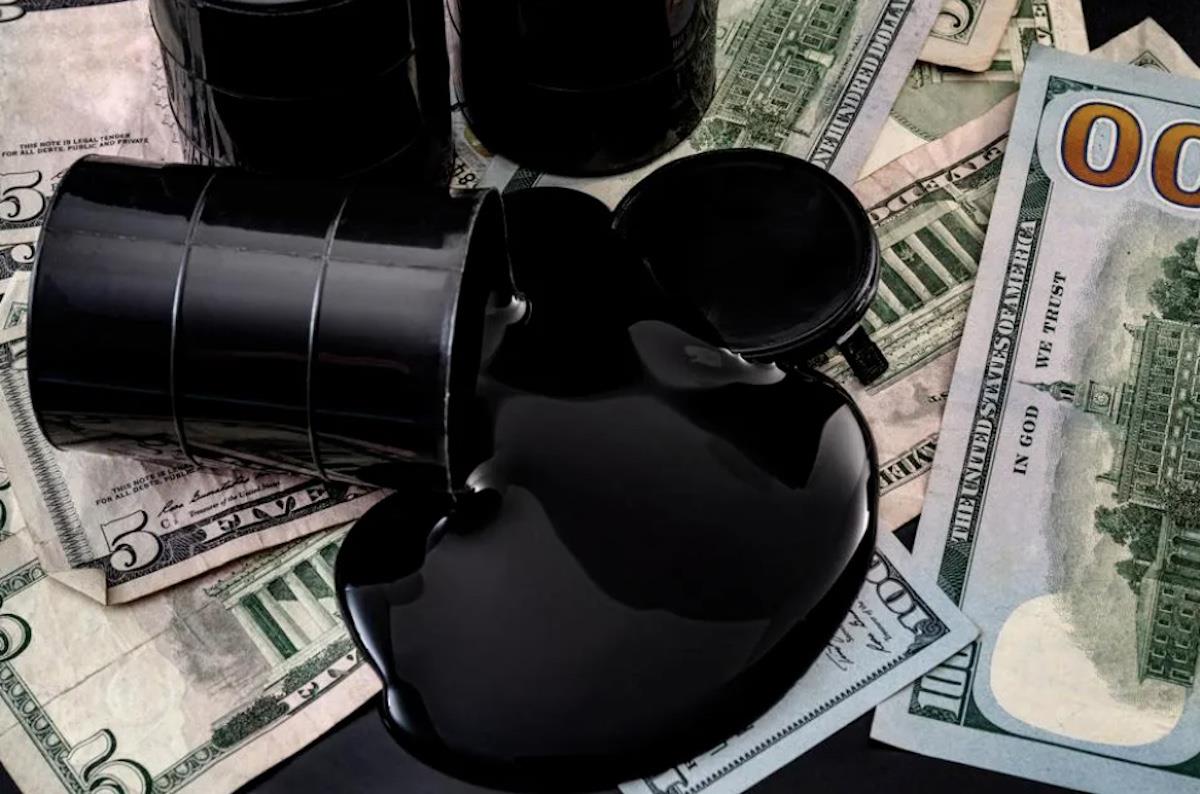
Iran-Israel Explosion Blows Asia's Fed Hopes Asunder
The former US Treasury secretary turned many heads with that contrarian pronouncement last week. In the 48 hours since Iran rained fire on Israel , many Fed forecasts have likely been blown to bits.
On top of that, the Organization of the Petroleum Exporting Countries cartel continues to keep a tight lid on oil production, causing Citigroup and others to foresee US$100 per barrel oil on the near-term horizon.
Together, all this suggests global inflation is likely to heat up as the year progresses, dashing certain hopes that prices might have peaked.
“What is not priced into the current market, in our view, is a potential continuation of a direct conflict between Iran and Israel, which we estimate could see oil prices trade up to +$100 per barrel, depending on the nature of the events,” notes Citi analyst Max Layton.
That, in turn, reduces the odds of Fed rate cuts in ways that imperil Asia's economic outlook in 2024.
“In a worst-case scenario, a forceful retaliation by Israel could trigger a spiral of escalation, potentially leading to an unprecedented regional conflict,” says Jorge Leon, senior vice president at Rystad Energy.“Under such circumstances, geopolitical premiums would increase significantly.”
This would quickly alter the calculus in China, Japan, South Korea and economies throughout Southeast Asia.
It's not just crude oil but also upward pressure on other vital commodities ranging from precious metals to coffee to cocoa. In the context of asset markets, the jumps in prices for copper, gold and other goods are raising particular alarm.
“Any rise in oil prices on higher geopolitical risks may be dampened by oil producers deciding to hedge their price risks and sell forward their production,” argue analysts at Goldman Sachs in a research note.
As“significant input for many industries,” Rebecca Babin, a top energy trader at CIBC Private Wealth, thinks“rising [commodity] prices will start to hurt growth” in corporate profits if higher prices are not able to be passed along to consumers.
At this point, though, no one really knows what they don't know about decisions in Jerusalem or Tehran in the days ahead.
“This war may move down the escalation ladder if the Israeli government follows the advice of the White House and forgoes retaliatory action,” says analyst Helima Croft at RBC Capital Markets.
Though Iranian action was“far more expansive than previous reprisals, it was still telegraphed in advance.”
Yet even before the weekend attack involving more than 300 missiles and drones, there were signs Fed Chairman Jerome Powell's team wouldn't be cutting rates several times in 2024.

US Federal Reserve Chairman Jerome Powell has new inflation factors to weigh in a possible Iran-Israel war. Image: Screengrab / NDTV
In March, the consumer price index rose at a faster-than-forecast 3.5% annual rate. As such, it's hard to see Fed officials who were reluctant to ease a week ago agreeing to cut rates now.

The myth of Chinese overcapacity

China's 'new productive forces' risk overcapacity bubble

Are EVs the future or merely a niche market?
That's particularly true with the US unemployment rate at just 3.8%. It won't be lost on the Fed, notes economist Kathy Bostjancic at Nationwide Mutual, that signs of full employment abound.
Those signs include average weekly hours worked ticking up to 34.4 from 34.3 in February and the labor force participation rate rising to 62.7% from 62.5%.
Yet the stakes just rose exponentially if oil prices skyrocket from here.
“If prices were to rally significantly on the back of supply losses, one would imagine that the group would look to bring some of this spare capacity back onto the market,” says Warren Patterson, head of commodities strategy at ING Bank.“OPEC will not want to see prices going too high given the risk of demand destruction.”
But, Patterson notes,“there's still plenty of uncertainty and it all depends on how Israel now responds.”
By ING's numbers, Iran produces over 3 million barrels of crude oil per day, making it OPEC's No 4 producer.
As such, Patterson notes, supply risks abound - from stringent oil sanctions and whether Israel's response in the days ahead hits Iran's energy infrastructure.
In Washington, US President Joe Biden's team could try to deploy US strategic petroleum reserves once again. At the same time, even OPEC might worry about the optics of letting oil prices surge unabated.
Not everyone worries energy prices are about to explode, though. Stephen Innes, managing partner at SPI Asset Management, says“while the drone attack has grabbed headlines, its immediate impact on global markets, particularly oil prices and inflation concerns , may be subdued.”
Innes adds that“the precision and limited lethal impact of Iran's response suggest a strategic approach aimed at minimizing damage rather than escalating tensions. As a result, the ripple effects on the oil market, a key determinant of global inflation dynamics, are expected to be somewhat muted.”
The bottom line, Innes says, is that“the situation remains fluid and headline risk will likely dominate for a while.”

Uncertainty surrounds how Israel will respond to Iran's drone strikes. Image: X Screengrab
Regardless, fresh turmoil in the Middle East means the Fed will“adopt a more cautious approach” when it comes to cutting rates, notes Neil Shearing, group chief economist at Capital Economics.
“We expect the first move in September,” Shearing says.“And, assuming that energy prices don't spiral over the next month or so, we think that both the European Central Bank and Bank of England will cut in June.”
Yet Iran's actions mark a“new and potentially significantly more dangerous phase in troubles in the region,” Shearing says. For now, the top wildcard is how an escalation in Gulf tensions will affect energy prices. Higher costs, he adds,“would complicate success in reducing inflation.”
Hence Summers' worries that the next Fed action may be to hit the monetary brakes.“You have to take seriously the possibility that the next rate move will be upwards rather than downwards,” Summers told Bloomberg.
Whatever the Fed decides, it seems the“higher-for-longer” era for US yields, one Asia entered 2024 convinced was over, will live on indefinitely. That's dreadful news for Asia's export-driven economies.
For China, the Fed delaying rate cuts – or not cutting them at all – could mean an even stronger US dollar. That, in turn, could further reduce the People's Bank of China's latitude to cut interest rates for fear of a falling yuan.
There are myriad reasons why the PBOC might not want the exchange rate to weaken. For one, it might make it harder for property developers to make offshore debt payments, upping the odds of default.
It might also squander progress in increasing global trust in the yuan. And a weaker yuan could also put Beijing on a crash course amid a highly contentious US election on November 5.
Here, too, there's great uncertainty about the trajectory of China's economy and how that, in turn, might impact Asian trade and oil prices more broadly.
“China's role as the primary driver for new oil consumption globally has come into doubt,” says analyst Herbert Crowther at Eurasia Group.“The world's second-biggest economy has emerged from the pandemic with significant short-term and structural challenges that will dent its fuel needs in 2024 and beyond.”
Crowther notes that“in the decade before the pandemic, China's huge and growing construction sector and rising auto sales were the single biggest engines of global oil demand growth. Time and again, Beijing's policymakers resorted to infrastructure and property sector stimulus to sustain rapid oil demand growth, fueled largely by middle distillates like diesel.”
Meanwhile, Crowther adds,“a fast-growing middle-income population segment purchased millions of new cars every month – virtually all running on gasoline before China's electric vehicle boom.”
For Japan, the idea that US yields will remain higher for significantly longer is a blow to its export-driven economy.

Sign up for one of our free newsletters
- The Daily ReportStart your day right with Asia Times' top stories AT Weekly ReportA weekly roundup of Asia Times' most-read stories
Japan limped into 2024 with an annual growth rate of just 0.4% in the fourth quarter of 2023 following a 3.3% contraction in the July-September period. The yen's plunge to 1990 lows, meanwhile, has the Bank of Japan mulling rate hikes.
Fed uncertainty will almost surely delay Governor Kazuo Ueda's next attempt to normalize Japanese monetary policy. Also, worries that continued high US rates might increase the risk of a policy mistake complicate Ueda's task.
One worry is that medium-size US banks might come under pressure, Silicon Valley Bank-style. Another is that continued tight credit might exacerbate the troubles facing the commercial
property
sector, post-Covid-19, sending financial shockwaves Asia's way.
The Fed, says Desmond Lachman, an economist at the American Enterprise Institute think tank, is paying close attention to the“slow-motion train wreck that is now occurring in the commercial real estate sector due to the high rate of office vacancies as more people work from home. This is now expected to cause office prices to fall by at least 40% from their 2022 peak level.”
That, in turn, Lachman notes,“together with high interest rates, is raising questions as to how property developers are going to be able to roll over the $930 billion in property loans that fall this year without a significant debt restructuring.”
“Unfortunately, it would be an understatement to say that the banking system in general, and the regional banks in particular, are not in a good position to make large loan loss provisions for their real estate lending,” he said.
Any turmoil emanating from the US banking system – or credit markets in general – could spell particular trouble for Southeast Asia 's export-reliant economies.
In Indonesia, Malaysia, the Philippines, Thailand and Vietnam, continued tight US central bank policies that limit China's ability to stimulate growth are not what regional policymakers had in mind for 2024.
Suffice to say, the Fed rate-cut-driven year that Asia envisioned is shifting by the day to one where US yields will be steady if not higher. Count that among the many ways things could go sideways for a region on the front lines of US rate volatility and unrealized policy expectations.
Follow William Pesek on X, formerly Twitter, at @WilliamPesek
Thank you for registering!
An account was already registered with this email. Please check your inbox for an authentication link.

Legal Disclaimer:
MENAFN provides the
information “as is” without warranty of any kind. We do not accept
any responsibility or liability for the accuracy, content, images,
videos, licenses, completeness, legality, or reliability of the information
contained in this article. If you have any complaints or copyright
issues related to this article, kindly contact the provider above.


















Comments
No comment